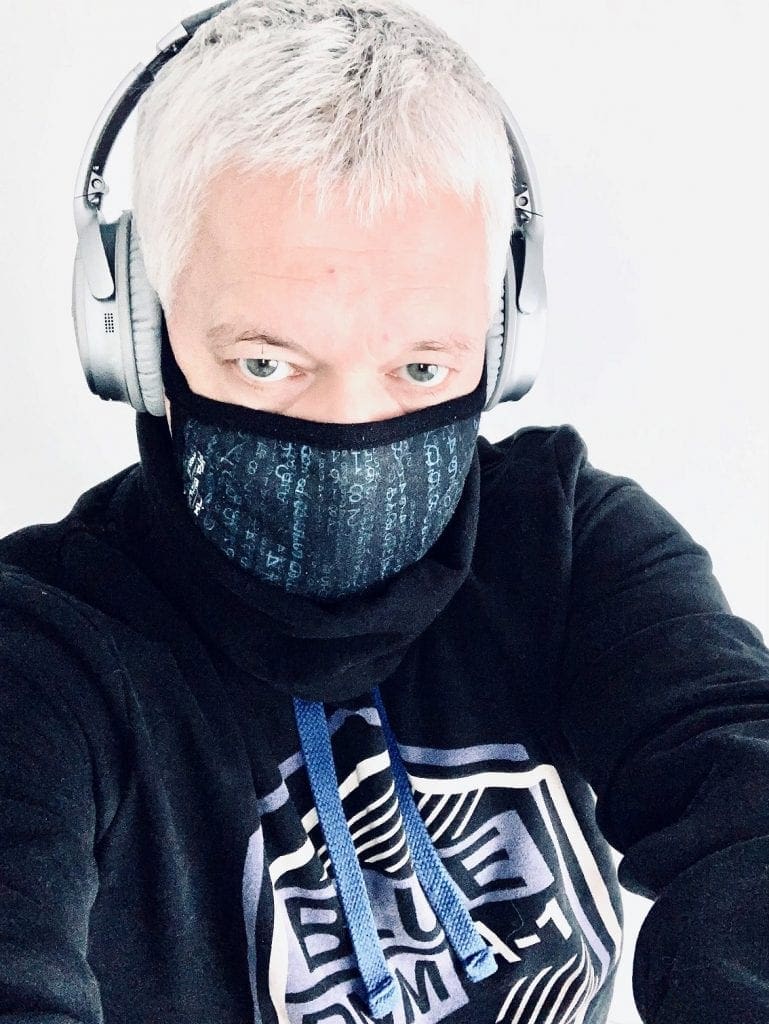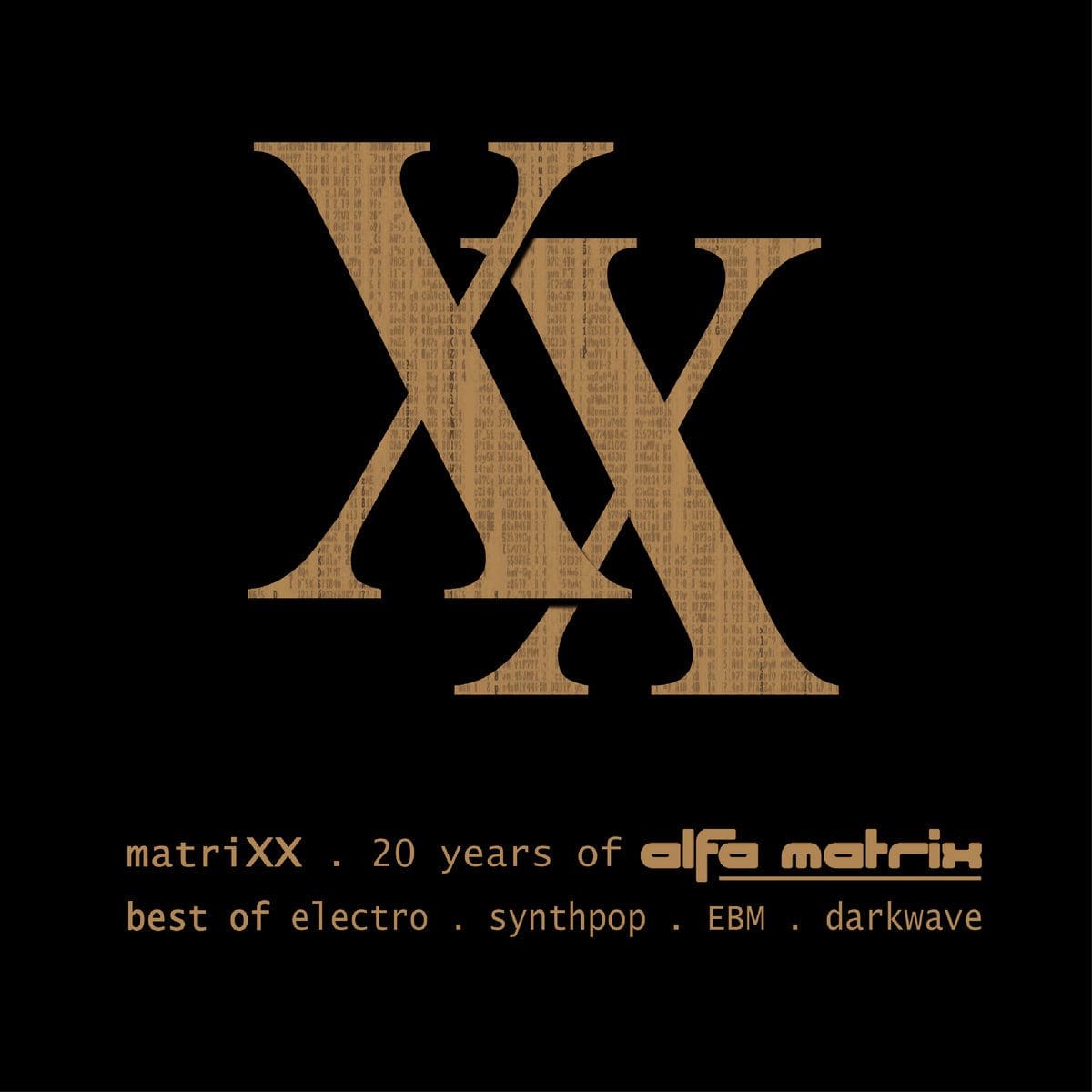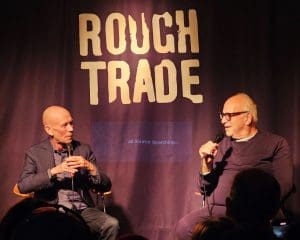’30 Years Of Journalism – Celebration Interview’ with SEBA DOLIMONT (Alfa Matrix): ‘If You Don’t Try To Anticipate The Future, Then It Will Get You’


Back in 1991 I started writing my first reviews for Side-Line magazine. I would have never thought to go on writing reviews and making interviews non-stop for 30 years. So 2021 is a special year to me, a kind of ‘celebration year’. I got the idea to celebrate this special event by interviewing people from the scene who all have a special meaning to me. The first interview I made in this series is with Séba Dolimont. He was Side-Line chief-redactor till the end of 2007. He’s now running Alfa Matrix for 20 years and got also involved as singer with AIBOFORCEN and [IN] TERNAL. But above all we’re best friends. We no longer need music to meet and speak about a lot of things although this interview is only about music…
(Courtesy by Inferno Sound Diaries; Stéphane Froidcoeur)
Q: We met more than thirty (!) years ago now. Back in time you were busy with Side-Line, which was a kind of ‘fanzine’. How do you look back at these ‘early’ years and what was your motivation to get involved with a magazine?
Séba: Time flies doesn’t it?! Well, the crazy idea of doing our own ‘zine’ was thrown on the table by my friend David Noiret back in the days, one of these nights at university when we were having fun, listening to music, having some drinks and reinventing the world… But the next day when we met again at school, the idea was stuck on our respective minds. Side-Line was born! With the aim to have a true fanzine devoted to dark underground music cos the only mag we had then in Belgium was getting more & more mainstream… We wanted to defend and promote the music from the side-line. We were then carried away by the unexpected positive response on our first issues.
A bunch of friends rapidly joined the team including my all-time friend & partner in crime Benoit Blanchart, Lol Chevaux from France… and YOU!
Q: Side-Line finally became one of the most renowned- and leading Electro/Industrial/Gothic magazines from the scene. What made it that special and maybe different from others?
Séba: Looking back at it, I think our true devotion to the scene and the quite wide musical culture of the editorial staff made the difference. We were also lucky to be one of the few first mags written in English (and this way accessible to a much wider audience) while at that time this scene was mostly covered by German mags. Once we had the opportunity of getting published on professional glossy format (by a German label (Celtic Circle Prod) and later by Claus Müller of Orkus!) magazine before becoming fully independent, powered by the unique design touch of Didier Delhez and with the challenging concept of having a CD attached to the magazine, we instantly got the massive support from all record labels, bands and the fans!
By then we had also started embracing the internet, many many years before everyone, thanks to the initiative of Ronan Harris (VNV NATION) and later the arrival of the one and only one Bernard Van Isacker who came and reinforced the digital and commercial strategy of the magazine, but also enlarged our journalistic approach thanks to his many connections with bigger bands and major labels. We were on orbit!
Q: You finally left Side-Line in 2007 because of some health troubles, but still to focalize on Alfa Matrix. As a label owner, what’s your perception of media/magazines today? What’s their impact and importance for a label?
Séba: This is still one of the most difficult decisions that I made in my ‘music’ life. But when as a father of 2 young boys you are stuck by a virus that abruptly attacks your heart and almost kills you, the long days and nights you spend at hospital allow you questioning your priorities in life. To find a more appropriate balance between family, your main job and your music passion, there was just one too much in the equation. I felt I still had much more to learn and experience for the label rather than for a magazine. I could also inject more flexibility in the label planning than for the magazine which had a strict release date planning and always imposed us long sleepless nights before the closure of each issue.
Since then I have unfortunately seen so many scene magazines falling apart one after the other because of a general disinterest from readers and a lack of support from labels and other potential advertisers. The difficulty of being active on a shrinking underground scene, in a fast evolving world where social media’s and internet sites rapidly challenge the relevance of your articles or the freshness of your news bits. And too many invested way too late in a combined complementary offer mixing on-line and print, or just did not. I am still very admirable and respectful though for the job and activities run by the few surviving print mags like Sonic Seducer or yet Orkus!. Their longevity is exemplary. Today as a label you need to mix various medias to reach your audience cos more than ever, the consumer today is king and decides his/her own information modes. Tough tough… but congrats to all journalists still investing time and energy in defending and supporting our beloved dark music scene. Without people like you Stef, who would we be?
Q: You set up Alfa Matrix while you still remained involved as chief editor of Side-Line. That sounds rather incestuous, don’t you think? How do you look back at it?
Séba: I hear you. It’s a point we discussed at creation of the label actually. I rapidly decided to be only publisher of the magazine and stopped my editorial activities. I focused only on the coordination and business side of the job, selling adverts, etc. And we always gave journalistic freedom to our editorial staff: no censorship, even for advertised releases… But our experience with the magazine and its related website was also one of the leverages that were there to put Alfa Matrix on orbit. We knew exactly the impact that Side-Line could have to help us launching new talents and new releases… So yes, you can describe it as incestuous, but in all magazines you can see clear financing by specific record labels and you see many band members or even label staff in editorial staff of several magazines. I see it more as expertise sharing. And if the connections and affinities help, this is what business is all about isn’t it?
My past work at Side-Line definitely helped me signing many artists to the label cos I had built a strong contact or friendship with them through the years…
Q: Alfa Matrix this year celebrates its 20th anniversary. What does that mean and how did you see things and the scene evolving over the years?
Séba: Honestly, I would have never thought that 2 decades later, we would still be up & running, and especially with such an impressive repertoire and diversified constellation of artists around us. It’s been an amazing adventure. With lots of exceptional moments. Lots of ups and downs also of course. Several bankruptcies from big distributors which each time put our finances at risk. Also a radically changing and constantly evolving music market on which you need to challenge yourself continuously to remain relevant and future proof.
If I were telling you that the future is bright and beautiful I would be lying to you. It’s obvious that there is no way back at this point. The dark underground scene keeps shrinking and losing ground. The several economic crisis, without mentioning the current pandemic and the changing music consumption habits all have heavy impact on sales potential. So I expect the physical format to be more and more limited and eventually get replaced by streaming. This is it! But with the right knowledge, it’s always possible to adapt your business model and move ahead. If you don’t try to anticipate the future, then it will get you.
Q: Physical sales are going backwards for years now. What do you expect during the next years and what will be the impact on the scene?
Séba: Bigger bands will still have some limited physical releases. Smaller newcomers will be available on streaming platforms. Once streaming gets generalized, the notion of albums will vanish and get replaced by one-song releases, getting published the next day they get recorded and mastered. Time to market will get zeroed and release radars will feed us proactively… and here again the underground world will loose more & more visibility against the algorithms. So yes, when people do not react timely and invest more in supporting younger acts, this will smother our indie art slowly but surely. But at Alfa Matrix, as long as we will have the energy to do all this, we’ will be there for you and for our artists.
Q: FRONT 242, this year celebrating their 40th anniversary, has been for sure your biggest signing; like a serious accomplishment for an underground label! How did you convince them to join the ‘matrix’ and how is it working with such a legendary formation?
Séba: The arrival of this cult Belgian band to the Matrix was indeed an amazing boost in our ascension in our very first months of existence. Years of friendships and mutual respect brought us together and it’s been a very great, fruitful and inspiring collaboration with them in all simplicity. Things flow and are obvious. We now released their ’91 live albums and managed selling out before release date, with over 50% of the pressings sold in direct by ourselves via our own webstore thanks to our amazing staunch fanbase. This is something we are very proud of.
The official collaboration started with the MALE OR FEMALE trilogy. Patrick and Daniel asked me back then helping them finding the right label for this new project cos they had been very deceived by labels from their past experiences. Back then Alfa Matrix was a tiny label with 5 bands, so I did not even consider making them an offer. I rapidly brought them a handful of contractual offers. And then they asked us why there was no offer from Alfa Matrix cos trust was very important for them! The rest is history. Respect to them and thank for the eternal trust.
Now when you say it’s our biggest signing, they are indeed a true legend. But it does not mean we don’t have other artists selling more than FRONT 242 actually! You could be surprised sometimes of the potential of our eclectic roster of artists…
Q: Some artists and their ego… you for sure know what I’m talking about! How do you manage this situation as label owner?
Séba: Well… it’s a tough one indeed. Now of course to be an artist and have an own creative concept, having an ego and a very own vision helps and makes you more pertinent. The main problem is when artists with a strong ego don’t have both feet on the ground and have no realistic grasp or knowledge of the market’s reality. Then things can turn wrong cos they can have unrealistic expectations. Sometimes also the ego is so strong that they turn into control freaks and prove not to be able to efficiently collaborate. We have been there a few times…
Being myself artists manager, through the years I started putting more and more attention to the persons themselves and not only the music. I need that click, that trustful gut feeling that tells me ‘yes we can’… Before signing anyone we take the time to talk, explain who we are, how we work. This way I try building a collaboration on solid grounds. Cos we really believe in long term collaborations in our label management concept. And when you check the longevity of the collaboration we have with a large majority of our way I wish I could do, I’m proud of the many friendships we built thanks to music…
Q: You’ve been an ‘artist’ yourself as you also were the singer of AIBOFORCEN and [IN] TERNAL. What did you keep in mind from both bands and why did you finally quit?
Séba: Yes indeed. It’s funny cos we actually started the label to self-release our 3rd album of AIBOFORCEN. We had several nice offers from big German labels but were so much deceived by our previous record deals that we made the decision to launch Alfa Matrix. But in the end through times the label activities prevented me from being in studio and at the end, the decision became obvious. I’m so happy Benoit continues injecting life into the project. I still of course help him from distance, making connections for new collaborations, giving him tips from demos he shares with me, etc. He’s currently working on his next album and what I heard so far is once again amazing! But here again, it was a deliberate choice, keeping the balance between family, my time demanding job and my music passion.
While [IN] TERNAL was more of a one-shot project with friends without constraints. We were all free at the right place at the same right moment, all wanting to do something new outside our respective main projects. I am still very proud of that album we released on Zoth Ommog back in the days…
Q: Thanks to music, you and I became very close friends. Any specific souvenir or anecdote you want to share?
Séba: So many memories that it’s too hard to pick a specific one. But chronologically, I will surely mention receiving your ‘Deranged Psyche’-compilation tapes on which I was each time discovering new bands… I had found my master ;-)! Bringing you massive orders of CD’s from my travels to Germany. Our exceptional adventures on the road driving from one festival to the other across Europe with some special souvenirs of preparing you the craziest sandwishes I could up to sleeping on soccer fields… Memorable after party nights with our Spanish DJ friends of Girona. The first days of FUZE BOX MACHINE up to NEBULA-H. Without mentioning the amazing editorial moments within the Side-Line teams and nowadays your honest, neutral and objective support to our Alfa Matrix label. But above all the unique friendship we both constructed that is today above all this music adventure and even makes that we can meet and talk hours long without even talking ‘music’…
Since you’re here …
… we have a small favour to ask. More people are reading Side-Line Magazine than ever but advertising revenues across the media are falling fast. Unlike many news organisations, we haven’t put up a paywall – we want to keep our journalism as open as we can - and we refuse to add annoying advertising. So you can see why we need to ask for your help.
Side-Line’s independent journalism takes a lot of time, money and hard work to produce. But we do it because we want to push the artists we like and who are equally fighting to survive.
If everyone who reads our reporting, who likes it, helps fund it, our future would be much more secure. For as little as 5 US$, you can support Side-Line Magazine – and it only takes a minute. Thank you.
The donations are safely powered by Paypal.











